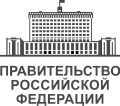Prime Minister of Russia
The Prime Minister of Russia (Russian: Премьер-министр России, Prem'er-ministr Rossii) is Russia's head of government. He is the second most powerful leader in the Russian Federation.
| Prime Minister of the Russian Federation Председатель Правительства Российской Федерации | |
|---|---|
 Logo Government of Russia | |
 | |
| Style | Mr. Chairman By name and patronymic (currently Mikhail Vladimirovich) His Excellency (informal international correspondence) |
| Member of | Government Security Council |
| Reports to | President State Duma |
| Residence | White House (working) |
| Seat | Moscow |
| Appointer | President of Russia, with the consent of the State Duma |
| Term length | No fixed term Resigns before the newly elected President, but may be reappointed again |
| Constituting instrument | Constitution of Russia |
| Inaugural holder | Count Sergei Witte (as Prime Minister of Russian Empire) Georgy Lvov (as Chairman of the Russian Provisional Government) Vladimir Lenin (as Premier of the Soviet Union) Boris Yeltsin (as Prime Minister of Russian Federation) |
| Formation | 6 November 1905 |
| Deputy | First Deputy Prime Minister Deputy Prime Ministers |
| Website | Official website |
The Prime Minister serves the same time as the President of Russia, and has a term of office of six years but may be appointed again.
The President appoints the Prime Minister and must be approved by the State Duma. Only two acting Prime Ministers: Yegor Gaidar and Viktor Chernomyrdin were appointed by the President, but not approved by the Duma. The most recent Prime Minister is Mikhail Mishustin since 16 January 2020.
List
change- .Alexander Menshikov (1726-1727
- .Fyodor Apraksin (1727-1728)
- 3.Gavriil Golovkin (1727)
- 4.Andrey Osterman (1727)
- 5.D.M. Golitskyn (with Alexander Menshikov)
- 6.P.A. Tolstoy (with Alexander Menshikov)
- Karl Gottorpsky (with Menshikov)
- Aleksei Dolgorukov (1728-30)
- Vasily Dolgorukov (1729-30)
- Gavriil Golovkin (1731-34)
- Andrey Ostaerman (1734-1740 and 1741)
Khristofor Minikh (1740-41)
- Stefan Apraksin (1756-1757)
- Alexey Ryumin (1757-1758)
- A. Buturlin (1758-1760)
- P. Shuvalov (1760-1762)
- M. Vorontsov (1762: 16 days)
- Peter III Romanov (1762)
- S. Strekalov (1768-1776)
- Sergey Witte (1905-1906)
- Ivan Goremykin (1906 & 1916)
- Pyotr Stolypin (1906-1911)
- Vladimir Kokovtsov (1911-1914)
- Boris Sturmer (1916)
- A. Trepov (1917)
- Georgy Lvov (1917)
- Alexander Kerensky (1917)
- Vladimir Lenin (1917-1924)
- Aleksei Rykov (1924-1929)
- Sergei Syrtsov (1929-1930)
- Daniil Sulimov (1930-1937)
- Nikolai Bulganin (1937-1938)
- Vasily Vakhrushev (1939-1940)
- Ivan Khokhlov (1940-1943)
- Alexey Kosygin (1943-1946)
- Mikhail Rodionov (1946-1949) executed in 1950.
- Boris Chernousov (1949-1952)
- Alexander Puzanov (1952-1956)
- Mikhail Yasnov (1956-1957)
- Frol Kozlov (1957-1958)
- Dmitry Polyansky (1958-1962)
- Gennady Voronov (1962-1971)
- Mikhail Solomentsev (1971-1983)
- Vitaly Vorotnikov (1983-1988)
- Alexander Vlasov (1988-1990)
- Ivan Silayev (1990-1991)
- Oleg Lobov (1991-1992)
- Boris Yeltsin (1992)
- Yegor Gaidar (1992)
- Viktor Chernomyrdyn (1992-1998)
- Sergey Kirienko (1998)
- Yevgeny Primakov (1999)
- Vladimir Putin (1999)
- Sergei Stepashin (1999)
- Mikhail Kasyanov (2000-2004)
- Viktor Kristenko (2004)
- Mikhail Fradkov (till 2007)
- Viktor Zubkov (2008)
- V. Putin (2008-2012) Succeeded to Presidency (2012-present)
- Dmitry Medvedev (2012-2020)
- Mikhail Mishustin (2020-)
Living former Prime Ministers
changeAs of 2022, there are eight living former Prime Ministers. The most recent death of a former Prime Minister was that of Yevgeny Primakov (1998–1999) on 26 June 2015, aged 85.
Other websites
change- Official Website of the Prime Minister of Russia (in Russian)
